浅析STM32之usbh_def.H
【温故而知新】类似文章浅析USB HID ReportDesc (HID报告描述符)
现在将en.stm32cubef1\STM32Cube_FW_F1_V1.4.0\Middlewares\ST\STM32_USB_Host_Library\Core\Inc\usbh_def.H
/**
******************************************************************************
* @file usbh_def.h
* @author MCD Application Team
* @version V3.2.2
* @date 07-July-2015
* @brief Definitions used in the USB host library
******************************************************************************
* @attention
*
* <h2><center>© COPYRIGHT 2015 STMicroelectronics</center></h2>
*
* Licensed under MCD-ST Liberty SW License Agreement V2, (the "License");
* You may not use this file except in compliance with the License.
* You may obtain a copy of the License at:
*
* http://www.st.com/software_license_agreement_liberty_v2
*
* Unless required by applicable law or agreed to in writing, software
* distributed under the License is distributed on an "AS IS" BASIS,
* WITHOUT WARRANTIES OR CONDITIONS OF ANY KIND, either express or implied.
* See the License for the specific language governing permissions and
* limitations under the License.
*
******************************************************************************
*/ /* Define to prevent recursive ----------------------------------------------*/
#ifndef USBH_DEF_H
#define USBH_DEF_H #ifdef __cplusplus
extern "C" {
#endif /* Includes ------------------------------------------------------------------*/
#include "usbh_conf.h" /** @addtogroup USBH_LIB
* @{
*/ /** @addtogroup USBH_LIB_CORE
* @{
*/ /** @defgroup USBH_DEF
* @brief This file is includes USB descriptors
* @{
*/ #ifndef NULL
#define NULL 0
#endif #ifndef FALSE
#define FALSE 0
#endif #ifndef TRUE
#define TRUE 1
#endif #define ValBit(VAR,POS) (VAR & (1 << POS))
#define SetBit(VAR,POS) (VAR |= (1 << POS))
#define ClrBit(VAR,POS) (VAR &= ((1 << POS)^255)) #define LE16(addr) (((uint16_t)(*((uint8_t *)(addr))))\
+ (((uint16_t)(*(((uint8_t *)(addr)) + ))) << )) #define LE16S(addr) (uint16_t)(LE16((addr))) #define LE32(addr) ((((uint32_t)(*(((uint8_t *)(addr)) + 0))) + \
(((uint32_t)(*(((uint8_t *)(addr)) + ))) << ) + \
(((uint32_t)(*(((uint8_t *)(addr)) + ))) << ) + \
(((uint32_t)(*(((uint8_t *)(addr)) + ))) << ))) #define LE64(addr) ((((uint64_t)(*(((uint8_t *)(addr)) + 0))) + \
(((uint64_t)(*(((uint8_t *)(addr)) + ))) << ) +\
(((uint64_t)(*(((uint8_t *)(addr)) + ))) << ) +\
(((uint64_t)(*(((uint8_t *)(addr)) + ))) << ) +\
(((uint64_t)(*(((uint8_t *)(addr)) + ))) << ) +\
(((uint64_t)(*(((uint8_t *)(addr)) + ))) << ) +\
(((uint64_t)(*(((uint8_t *)(addr)) + ))) << ) +\
(((uint64_t)(*(((uint8_t *)(addr)) + ))) << ))) #define LE24(addr) ((((uint32_t)(*(((uint8_t *)(addr)) + 0))) + \
(((uint32_t)(*(((uint8_t *)(addr)) + ))) << ) + \
(((uint32_t)(*(((uint8_t *)(addr)) + ))) << ))) #define LE32S(addr) (int32_t)(LE32((addr))) #define USB_LEN_DESC_HDR 0x02
#define USB_LEN_DEV_DESC 0x12
#define USB_LEN_CFG_DESC 0x09
#define USB_LEN_IF_DESC 0x09
#define USB_LEN_EP_DESC 0x07
#define USB_LEN_OTG_DESC 0x03
#define USB_LEN_SETUP_PKT 0x08 /* bmRequestType :D7 Data Phase Transfer Direction */
#define USB_REQ_DIR_MASK 0x80
#define USB_H2D 0x00
#define USB_D2H 0x80 /* bmRequestType D6..5 Type */
#define USB_REQ_TYPE_STANDARD 0x00
#define USB_REQ_TYPE_CLASS 0x20
#define USB_REQ_TYPE_VENDOR 0x40
#define USB_REQ_TYPE_RESERVED 0x60 /* bmRequestType D4..0 Recipient */
#define USB_REQ_RECIPIENT_DEVICE 0x00
#define USB_REQ_RECIPIENT_INTERFACE 0x01
#define USB_REQ_RECIPIENT_ENDPOINT 0x02
#define USB_REQ_RECIPIENT_OTHER 0x03 /* Table 9-4. Standard Request Codes */
/* bRequest , Value */
#define USB_REQ_GET_STATUS 0x00
#define USB_REQ_CLEAR_FEATURE 0x01
#define USB_REQ_SET_FEATURE 0x03
#define USB_REQ_SET_ADDRESS 0x05
#define USB_REQ_GET_DESCRIPTOR 0x06
#define USB_REQ_SET_DESCRIPTOR 0x07
#define USB_REQ_GET_CONFIGURATION 0x08
#define USB_REQ_SET_CONFIGURATION 0x09
#define USB_REQ_GET_INTERFACE 0x0A
#define USB_REQ_SET_INTERFACE 0x0B
#define USB_REQ_SYNCH_FRAME 0x0C /* Table 9-5. Descriptor Types of USB Specifications */
#define USB_DESC_TYPE_DEVICE 1
#define USB_DESC_TYPE_CONFIGURATION 2
#define USB_DESC_TYPE_STRING 3
#define USB_DESC_TYPE_INTERFACE 4
#define USB_DESC_TYPE_ENDPOINT 5
#define USB_DESC_TYPE_DEVICE_QUALIFIER 6
#define USB_DESC_TYPE_OTHER_SPEED_CONFIGURATION 7
#define USB_DESC_TYPE_INTERFACE_POWER 8
#define USB_DESC_TYPE_HID 0x21
#define USB_DESC_TYPE_HID_REPORT 0x22 #define USB_DEVICE_DESC_SIZE 18
#define USB_CONFIGURATION_DESC_SIZE 9
#define USB_HID_DESC_SIZE 9
#define USB_INTERFACE_DESC_SIZE 9
#define USB_ENDPOINT_DESC_SIZE 7 /* Descriptor Type and Descriptor Index */
/* Use the following values when calling the function USBH_GetDescriptor */
#define USB_DESC_DEVICE ((USB_DESC_TYPE_DEVICE << 8) & 0xFF00)
#define USB_DESC_CONFIGURATION ((USB_DESC_TYPE_CONFIGURATION << 8) & 0xFF00)
#define USB_DESC_STRING ((USB_DESC_TYPE_STRING << 8) & 0xFF00)
#define USB_DESC_INTERFACE ((USB_DESC_TYPE_INTERFACE << 8) & 0xFF00)
#define USB_DESC_ENDPOINT ((USB_DESC_TYPE_INTERFACE << 8) & 0xFF00)
#define USB_DESC_DEVICE_QUALIFIER ((USB_DESC_TYPE_DEVICE_QUALIFIER << 8) & 0xFF00)
#define USB_DESC_OTHER_SPEED_CONFIGURATION ((USB_DESC_TYPE_OTHER_SPEED_CONFIGURATION << 8) & 0xFF00)
#define USB_DESC_INTERFACE_POWER ((USB_DESC_TYPE_INTERFACE_POWER << 8) & 0xFF00)
#define USB_DESC_HID_REPORT ((USB_DESC_TYPE_HID_REPORT << 8) & 0xFF00)
#define USB_DESC_HID ((USB_DESC_TYPE_HID << 8) & 0xFF00) #define USB_EP_TYPE_CTRL 0x00
#define USB_EP_TYPE_ISOC 0x01
#define USB_EP_TYPE_BULK 0x02
#define USB_EP_TYPE_INTR 0x03 #define USB_EP_DIR_OUT 0x00
#define USB_EP_DIR_IN 0x80
#define USB_EP_DIR_MSK 0x80 #ifndef USBH_MAX_PIPES_NBR
#define USBH_MAX_PIPES_NBR 15
#endif /* USBH_MAX_PIPES_NBR */ #define USBH_DEVICE_ADDRESS_DEFAULT 0
#define USBH_MAX_ERROR_COUNT 2
#define USBH_DEVICE_ADDRESS 1 /**
* @}
*/ #define USBH_CONFIGURATION_DESCRIPTOR_SIZE (USB_CONFIGURATION_DESC_SIZE \
+ USB_INTERFACE_DESC_SIZE\
+ (USBH_MAX_NUM_ENDPOINTS * USB_ENDPOINT_DESC_SIZE)) #define CONFIG_DESC_wTOTAL_LENGTH (ConfigurationDescriptorData.ConfigDescfield.\
ConfigurationDescriptor.wTotalLength) typedef union
{
uint16_t w;
struct BW
{
uint8_t msb;
uint8_t lsb;
}
bw;
}
uint16_t_uint8_t; typedef union _USB_Setup
{
uint32_t d8[]; struct _SetupPkt_Struc
{
uint8_t bmRequestType;
uint8_t bRequest;
uint16_t_uint8_t wValue;
uint16_t_uint8_t wIndex;
uint16_t_uint8_t wLength;
} b;
}
USB_Setup_TypeDef; typedef struct _DescHeader
{
uint8_t bLength;
uint8_t bDescriptorType;
}
USBH_DescHeader_t; typedef struct _DeviceDescriptor
{
uint8_t bLength;
uint8_t bDescriptorType;
uint16_t bcdUSB; /* USB Specification Number which device complies too */
uint8_t bDeviceClass;
uint8_t bDeviceSubClass;
uint8_t bDeviceProtocol;
/* If equal to Zero, each interface specifies its own class
code if equal to 0xFF, the class code is vendor specified.
Otherwise field is valid Class Code.*/
uint8_t bMaxPacketSize;
uint16_t idVendor; /* Vendor ID (Assigned by USB Org) */
uint16_t idProduct; /* Product ID (Assigned by Manufacturer) */
uint16_t bcdDevice; /* Device Release Number */
uint8_t iManufacturer; /* Index of Manufacturer String Descriptor */
uint8_t iProduct; /* Index of Product String Descriptor */
uint8_t iSerialNumber; /* Index of Serial Number String Descriptor */
uint8_t bNumConfigurations; /* Number of Possible Configurations */
}
USBH_DevDescTypeDef; typedef struct _EndpointDescriptor
{
uint8_t bLength;
uint8_t bDescriptorType;
uint8_t bEndpointAddress; /* indicates what endpoint this descriptor is describing */
uint8_t bmAttributes; /* specifies the transfer type. */
uint16_t wMaxPacketSize; /* Maximum Packet Size this endpoint is capable of sending or receiving */
uint8_t bInterval; /* is used to specify the polling interval of certain transfers. */
}
USBH_EpDescTypeDef; typedef struct _InterfaceDescriptor
{
uint8_t bLength;
uint8_t bDescriptorType;
uint8_t bInterfaceNumber;
uint8_t bAlternateSetting; /* Value used to select alternative setting */
uint8_t bNumEndpoints; /* Number of Endpoints used for this interface */
uint8_t bInterfaceClass; /* Class Code (Assigned by USB Org) */
uint8_t bInterfaceSubClass; /* Subclass Code (Assigned by USB Org) */
uint8_t bInterfaceProtocol; /* Protocol Code */
uint8_t iInterface; /* Index of String Descriptor Describing this interface */
USBH_EpDescTypeDef Ep_Desc[USBH_MAX_NUM_ENDPOINTS];
}
USBH_InterfaceDescTypeDef; typedef struct _ConfigurationDescriptor
{
uint8_t bLength;
uint8_t bDescriptorType;
uint16_t wTotalLength; /* Total Length of Data Returned */
uint8_t bNumInterfaces; /* Number of Interfaces */
uint8_t bConfigurationValue; /* Value to use as an argument to select this configuration*/
uint8_t iConfiguration; /*Index of String Descriptor Describing this configuration */
uint8_t bmAttributes; /* D7 Bus Powered , D6 Self Powered, D5 Remote Wakeup , D4..0 Reserved (0)*/
uint8_t bMaxPower; /*Maximum Power Consumption */
USBH_InterfaceDescTypeDef Itf_Desc[USBH_MAX_NUM_INTERFACES];
}
USBH_CfgDescTypeDef; /* Following USB Host status */
typedef enum
{
USBH_OK = ,
USBH_BUSY,
USBH_FAIL,
USBH_NOT_SUPPORTED,
USBH_UNRECOVERED_ERROR,
USBH_ERROR_SPEED_UNKNOWN,
}USBH_StatusTypeDef; /** @defgroup USBH_CORE_Exported_Types
* @{
*/ typedef enum
{
USBH_SPEED_HIGH = ,
USBH_SPEED_FULL = ,
USBH_SPEED_LOW = , }USBH_SpeedTypeDef; /* Following states are used for gState */
typedef enum
{
HOST_IDLE =,
HOST_DEV_WAIT_FOR_ATTACHMENT,
HOST_DEV_ATTACHED,
HOST_DEV_DISCONNECTED,
HOST_DETECT_DEVICE_SPEED,
HOST_ENUMERATION,
HOST_CLASS_REQUEST,
HOST_INPUT,
HOST_SET_CONFIGURATION,
HOST_CHECK_CLASS,
HOST_CLASS,
HOST_SUSPENDED,
HOST_ABORT_STATE,
}HOST_StateTypeDef; /* Following states are used for EnumerationState */
typedef enum
{
ENUM_IDLE = ,
ENUM_GET_FULL_DEV_DESC,
ENUM_SET_ADDR,
ENUM_GET_CFG_DESC,
ENUM_GET_FULL_CFG_DESC,
ENUM_GET_MFC_STRING_DESC,
ENUM_GET_PRODUCT_STRING_DESC,
ENUM_GET_SERIALNUM_STRING_DESC,
} ENUM_StateTypeDef; /* Following states are used for CtrlXferStateMachine */
typedef enum
{
CTRL_IDLE =,
CTRL_SETUP,
CTRL_SETUP_WAIT,
CTRL_DATA_IN,
CTRL_DATA_IN_WAIT,
CTRL_DATA_OUT,
CTRL_DATA_OUT_WAIT,
CTRL_STATUS_IN,
CTRL_STATUS_IN_WAIT,
CTRL_STATUS_OUT,
CTRL_STATUS_OUT_WAIT,
CTRL_ERROR,
CTRL_STALLED,
CTRL_COMPLETE
}CTRL_StateTypeDef; /* Following states are used for RequestState */
typedef enum
{
CMD_IDLE =,
CMD_SEND,
CMD_WAIT
} CMD_StateTypeDef; typedef enum {
USBH_URB_IDLE = ,
USBH_URB_DONE,
USBH_URB_NOTREADY,
USBH_URB_NYET,
USBH_URB_ERROR,
USBH_URB_STALL
}USBH_URBStateTypeDef; typedef enum
{
USBH_PORT_EVENT = ,
USBH_URB_EVENT,
USBH_CONTROL_EVENT,
USBH_CLASS_EVENT,
USBH_STATE_CHANGED_EVENT,
}
USBH_OSEventTypeDef; /* Control request structure */
typedef struct
{
uint8_t pipe_in;
uint8_t pipe_out;
uint8_t pipe_size;
uint8_t *buff;
uint16_t length;
uint16_t timer;
USB_Setup_TypeDef setup;
CTRL_StateTypeDef state;
uint8_t errorcount; } USBH_CtrlTypeDef; /* Attached device structure */
typedef struct
{
#if (USBH_KEEP_CFG_DESCRIPTOR == 1)
uint8_t CfgDesc_Raw[USBH_MAX_SIZE_CONFIGURATION];
#endif
uint8_t Data[USBH_MAX_DATA_BUFFER];
uint8_t address;
uint8_t speed;
__IO uint8_t is_connected;
uint8_t current_interface;
USBH_DevDescTypeDef DevDesc;
USBH_CfgDescTypeDef CfgDesc; }USBH_DeviceTypeDef; struct _USBH_HandleTypeDef; /* USB Host Class structure */
typedef struct
{
const char *Name;
uint8_t ClassCode;
USBH_StatusTypeDef (*Init) (struct _USBH_HandleTypeDef *phost);
USBH_StatusTypeDef (*DeInit) (struct _USBH_HandleTypeDef *phost);
USBH_StatusTypeDef (*Requests) (struct _USBH_HandleTypeDef *phost);
USBH_StatusTypeDef (*BgndProcess) (struct _USBH_HandleTypeDef *phost);
USBH_StatusTypeDef (*SOFProcess) (struct _USBH_HandleTypeDef *phost);
void* pData;
} USBH_ClassTypeDef; /* USB Host handle structure */
typedef struct _USBH_HandleTypeDef
{
__IO HOST_StateTypeDef gState; /* Host State Machine Value */
ENUM_StateTypeDef EnumState; /* Enumeration state Machine */
CMD_StateTypeDef RequestState;
USBH_CtrlTypeDef Control;
USBH_DeviceTypeDef device;
USBH_ClassTypeDef* pClass[USBH_MAX_NUM_SUPPORTED_CLASS];
USBH_ClassTypeDef* pActiveClass;
uint32_t ClassNumber;
uint32_t Pipes[];
__IO uint32_t Timer;
uint8_t id;
void* pData;
void (* pUser )(struct _USBH_HandleTypeDef *pHandle, uint8_t id); #if (USBH_USE_OS == 1)
osMessageQId os_event;
osThreadId thread;
#endif } USBH_HandleTypeDef; #if defined ( __GNUC__ )
#ifndef __weak
#define __weak __attribute__((weak))
#endif /* __weak */
#ifndef __packed
#define __packed __attribute__((__packed__))
#endif /* __packed */
#endif /* __GNUC__ */ #ifdef __cplusplus
}
#endif #endif /* USBH_DEF_H */ /************************ (C) COPYRIGHT STMicroelectronics *****END OF FILE****/
现在我们先看看 USBH_DevDescTypeDef结构体
/* Attached device structure */
typedef struct
{
#if (USBH_KEEP_CFG_DESCRIPTOR == 1)
uint8_t CfgDesc_Raw[USBH_MAX_SIZE_CONFIGURATION];
#endif
uint8_t Data[USBH_MAX_DATA_BUFFER];
uint8_t address;
uint8_t speed;
__IO uint8_t is_connected;
uint8_t current_interface;
USBH_DevDescTypeDef DevDesc;
USBH_CfgDescTypeDef CfgDesc; }USBH_DeviceTypeDef;
在看 USBH_DevDescTypeDef DevDesc之前我们先看 Universal Serial Bus Specification Revision 2.0 的
Table 9-8. Standard Device Descriptor
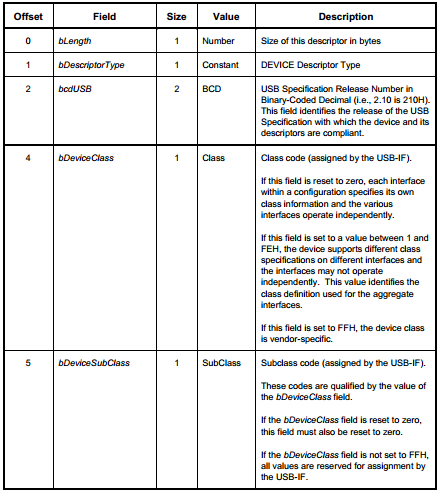
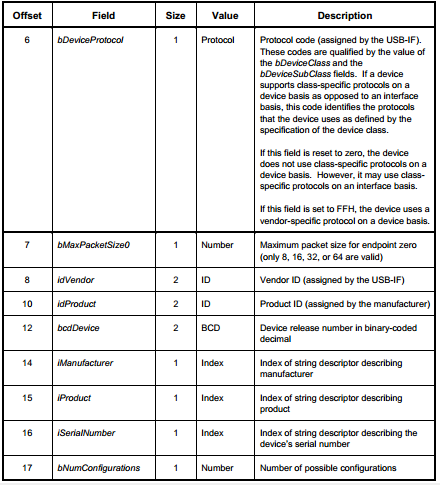
会发现USBH_DevDescTypeDef DevDesc就是上面的表格
typedef struct _DeviceDescriptor
{
uint8_t bLength;
uint8_t bDescriptorType;
uint16_t bcdUSB; /* USB Specification Number which device complies too */
uint8_t bDeviceClass;
uint8_t bDeviceSubClass;
uint8_t bDeviceProtocol;
/* If equal to Zero, each interface specifies its own class
code if equal to 0xFF, the class code is vendor specified.
Otherwise field is valid Class Code.*/
uint8_t bMaxPacketSize;
uint16_t idVendor; /* Vendor ID (Assigned by USB Org) */
uint16_t idProduct; /* Product ID (Assigned by Manufacturer) */
uint16_t bcdDevice; /* Device Release Number */
uint8_t iManufacturer; /* Index of Manufacturer String Descriptor */
uint8_t iProduct; /* Index of Product String Descriptor */
uint8_t iSerialNumber; /* Index of Serial Number String Descriptor */
uint8_t bNumConfigurations; /* Number of Possible Configurations */
}
USBH_DevDescTypeDef;
在看 USBH_CfgDescTypeDef CfgDesc;之前我们看看
Table 9-10. Standard Configuration Descriptor
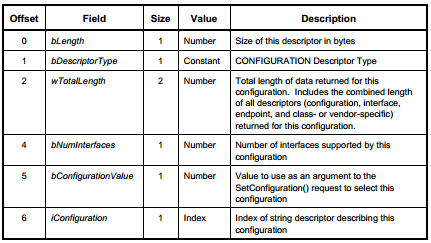
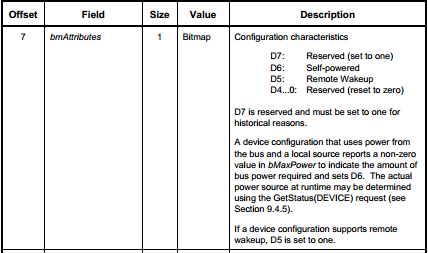
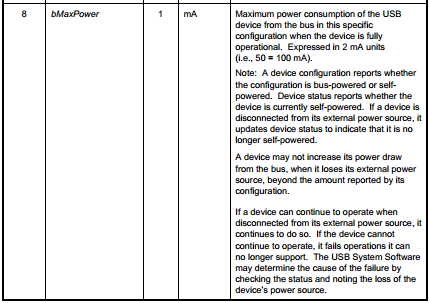
但是我们USBH_CfgDescTypeDef CfgDesc中多了USBH_InterfaceDescTypeDef Itf_Desc[USBH_MAX_NUM_INTERFACES]
typedef struct _ConfigurationDescriptor
{
uint8_t bLength;
uint8_t bDescriptorType;
uint16_t wTotalLength; /* Total Length of Data Returned */
uint8_t bNumInterfaces; /* Number of Interfaces */
uint8_t bConfigurationValue; /* Value to use as an argument to select this configuration*/
uint8_t iConfiguration; /*Index of String Descriptor Describing this configuration */
uint8_t bmAttributes; /* D7 Bus Powered , D6 Self Powered, D5 Remote Wakeup , D4..0 Reserved (0)*/
uint8_t bMaxPower; /*Maximum Power Consumption */
USBH_InterfaceDescTypeDef Itf_Desc[USBH_MAX_NUM_INTERFACES];
}
USBH_CfgDescTypeDef;
我们继续翻书
Table 9-12. Standard Interface Descriptor
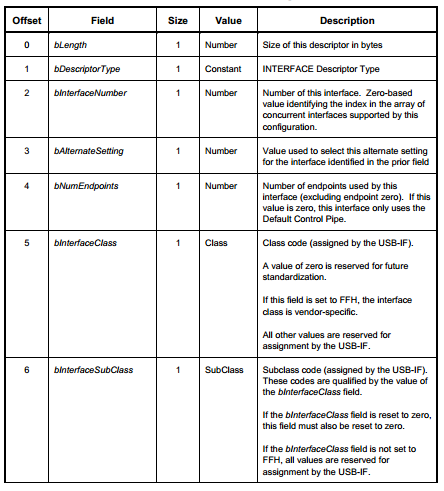
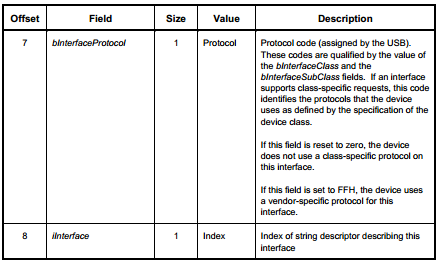
我们会发现USBH_InterfaceDescTypeDef中有多了 USBH_EpDescTypeDef Ep_Desc[USBH_MAX_NUM_ENDPOINTS];
typedef struct _InterfaceDescriptor
{
uint8_t bLength;
uint8_t bDescriptorType;
uint8_t bInterfaceNumber;
uint8_t bAlternateSetting; /* Value used to select alternative setting */
uint8_t bNumEndpoints; /* Number of Endpoints used for this interface */
uint8_t bInterfaceClass; /* Class Code (Assigned by USB Org) */
uint8_t bInterfaceSubClass; /* Subclass Code (Assigned by USB Org) */
uint8_t bInterfaceProtocol; /* Protocol Code */
uint8_t iInterface; /* Index of String Descriptor Describing this interface */
USBH_EpDescTypeDef Ep_Desc[USBH_MAX_NUM_ENDPOINTS];
}
USBH_InterfaceDescTypeDef;
还是老规则先翻书
Table 9-13. Standard Endpoint Descriptor
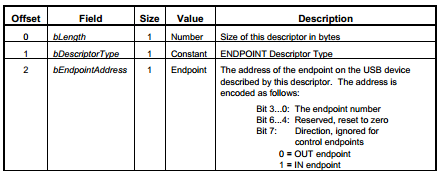
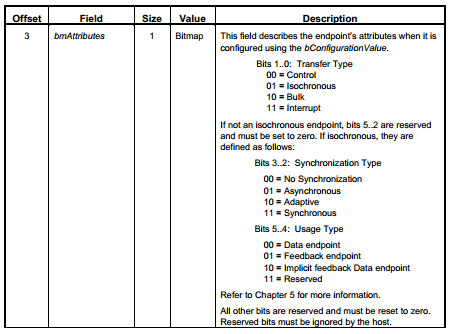
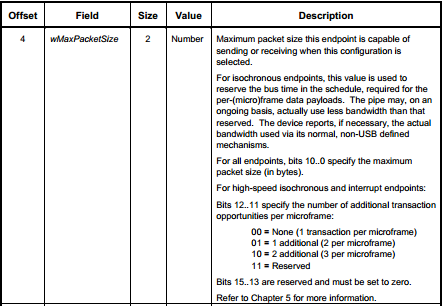
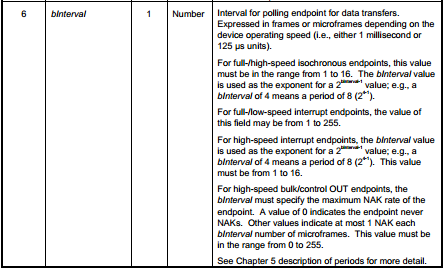
typedef struct _EndpointDescriptor
{
uint8_t bLength;
uint8_t bDescriptorType;
uint8_t bEndpointAddress; /* indicates what endpoint this descriptor is describing */
uint8_t bmAttributes; /* specifies the transfer type. */
uint16_t wMaxPacketSize; /* Maximum Packet Size this endpoint is capable of sending or receiving */
uint8_t bInterval; /* is used to specify the polling interval of certain transfers. */
}
USBH_EpDescTypeDef;
其实上面的描述符
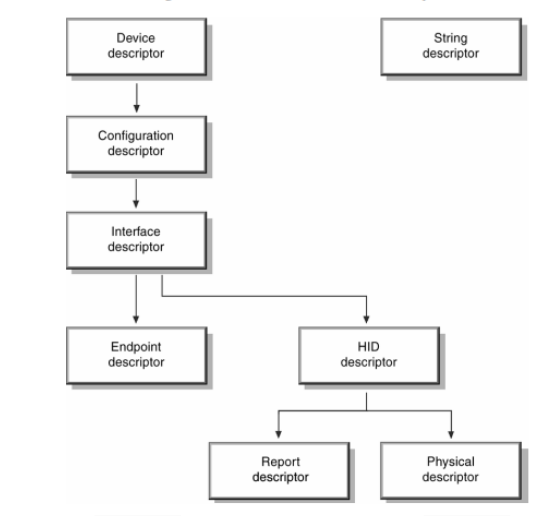
浅析STM32之usbh_def.H的更多相关文章
- [转]一个基于完成端口的TCP Server Framework,浅析IOCP
[转]一个基于完成端口的TCP Server Framework,浅析IOCP http://www.cppblog.com/adapterofcoms/archive/2010/06/26/1187 ...
- 文件IO 练习题
3.1 当读/写磁盘文件时,本章中描述的函数是否具有缓冲机制?请说明原因. 3.1 所有的磁盘 I/O 都要经过内核的块缓冲区(也称为内核的缓冲区高速缓存),唯一例 外的是对原始磁盘设备的 I/O,但 ...
- C++虚函数解析(转载)
虚函数详解第一篇:对象内存模型浅析 C++中的虚函数的内部实现机制到底是怎样的呢? 鉴于涉及到的内容有点多,我将分三篇文章来介绍. 第一篇:对象内存模型浅析,这里我将对对象的内存模型进 ...
- Vue3全局APi解析-源码学习
本文章共5314字,预计阅读时间5-15分钟. 前言 不知不觉Vue-next的版本已经来到了3.1.2,最近对照着源码学习Vue3的全局Api,边学习边整理了下来,希望可以和大家一起进步. 我们以官 ...
- LibOpenCM3(一) Linux下命令行开发环境配置
目录 LibOpenCM3(一) Linux下命令行开发环境配置 本文使用 Linux 环境, 硬件为 STM32F103 系列开发板 LibOpenCM3 介绍 LibOpenCM3 是GPL协议( ...
- 04C++核心编程
Day01 笔记 1 C++概述 1.1 C++两大编程思想 1.1.1 面向对象 1.1.2 泛型编程 1.2 移植性和标准 1.2.1 ANSI 在1998制定出C++第一套标准 2 c++初识 ...
- STM32之RTC配置与初始化-rtc.h rtc.c
<rtc.h> #include "stm32f10x.h" #ifndef _RTC_H #define _RTC_H typedef struct { vu8 ho ...
- keil编译STM32工程时 #error directive: "Please select first the target STM32F10x device used in your application (in stm32f10x.h file)"
我们可以双击错误,然后会自动定位到文件 stm32f10x.h 中出错的地方,可以看到代码: #if !defined (STM32F10X_LD) && !defined (STM3 ...
- 关于STM32工程的错误,狗血错误。。。..\CMSIS\core_cm3.h(1087): error: #20: identifier "IRQn_Type" is undefined
这件事还是要写一篇博客了,为了后来的人不换致命性的错误 辛辛苦苦写的一个四个不同的引脚不同时钟不同寄存器分别产生四种不同占空比不同周期的信号方波程序超级经典 PS:页尾上传PWM波形产生工程附件供大 ...
随机推荐
- 【springboot】之将properties配置转为bean
将springboot里面非application.yml 或者application.properties 里面的key-value转为JavaBean /** * @Describe: DataS ...
- 【剑指offer】规则二维数组查找
在一个二维数组中(每个一维数组的长度相同),每一行都按照从左到右递增的顺序排序,每一列都按照从上到下递增的顺序排序.请完成一个函数,输入这样的一个二维数组和一个整数,判断数组中是否含有该整数. 思路: ...
- PAT 乙级 1047 编程团体赛(20) C++版
1047. 编程团体赛(20) 时间限制 400 ms 内存限制 65536 kB 代码长度限制 8000 B 判题程序 Standard 作者 CHEN, Yue 编程团体赛的规则为:每个参赛队由若 ...
- SEO 图片用IMG插入好还是用Background定义好?
主要的区别就是,background搜索引擎室不知道图片内容说什么的.而img,是可以通过alt标签向搜索引擎描述你图片的内容.所以如果这张图片对你网站内容有帮助,那最好用img,如果没有什么用处的话 ...
- linux 查看进程启动路径
在linux下查看进程大家都会想到用 ps -ef|grep XXX 可是看到的不是全路径,怎么看全路径呢? 每个进程启动之后在 /proc下面有一个于pid对应的路径 例如:ps -ef|grep ...
- 构建Redis主从镜像
构建Redis的基础镜像,然后基于这个基础镜像构建主Redis镜像和从Redis镜像. 1.构建Redis基础镜像 创建redis基础镜像目录 [root@localhost mnt]# mkdir ...
- [UE4]通过使用Set TimerByFunctionName来实现反射机制
- ZBrush常用3D术语
转自:http://www.zbrushcn.com/jichu/zbrush-cy-3dsys.html Polygon(多边形) 多边形是一种形状,通过在3D空间连接几个点而创建,最简单的形式就是 ...
- 有关于Integer的一些小问题
先看一小段源码: Integer a1=; Integer a2=; Integer b1=); Integer b2=); Integer c1=; Integer c2=; System.out. ...
- CF1017G The Tree
/* 这是什么神仙题目QAQ 首先考虑在序列上的问题 先不考虑修改成白色, 一个白点能r被染成黑色 意味着能够找到一个l使得在l-r中的操作1次数大于等于 r - l + 1 我们把初始值覆盖成-1就 ...
